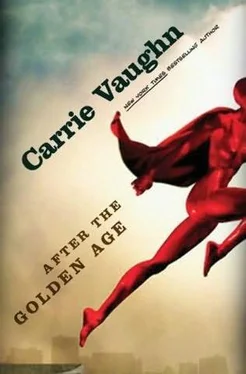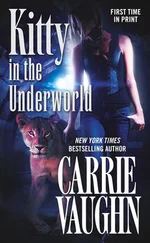She came to lean on the wall next to him. She took the bottle away, pulled out the cap, and took a swig. Rolled the liquid over her tongue before swallowing. Not the best, but it burned going down, and that was what mattered. It even dulled her headache. She set the bottle down on the desk.
“Mom and Dad think you have a life,” she said. “They think you have a psychiatry practice, a home to go to. Hobbies. But you come here, pop a few sleeping pills, and that’s it, isn’t it?”
“Celia, why are you here?” he said tiredly.
She caught his gaze and invited him to look at the scenes playing behind her eyes. She studied his expression, looking for that flicker of change, hoping to see something in him that might reflect his thoughts. He was too used to keeping that mask on.
But he brought his hand up and traced the line of her jaw. Then the hand dropped, and so did his gaze.
She took his face in her hands, pressing his cheeks, not forcing him to look at her, but drawing herself close to him. She spoke in his ear, so he could hear the words as well as feel her thoughts.
“You are the only person who has never been disappointed in me. It hurts me to see you unhappy.”
He gripped her arms. “Celia, you don’t understand. I cannot be in love with you. The way I am, it would hurt you, and I refuse to do that, I cannot—”
And she could feel it, the tendrils of his emotions reaching for her, winding themselves around her, binding them together. Like the drunken stupor he shared with his housemates, his emotions, even love, rippled out from him and did damage.
He straightened, pulling away from her. “You see,” he said, struggling to keep his voice steady. “I never know if my feelings are returned, or if they’re merely my own feelings reflected back at me.”
“Arthur. I came here because I wanted to. Because I love you.”
In so many ways, so many times, she’d held his example before herself as a model, a way of being to aspire to. But now, she had to make the first move. She had to go to him, and be the example. She put one hand in his and squeezed; with the other hand she touched his cheek to turn his face toward her. She was just tall enough to reach for him, draw him toward her, and kiss his lips. Just once, softly, so she could feel his breath on her. His eyes were squeezed shut, bracing.
“You won’t hurt me,” she whispered. “You’ve been inside my mind a hundred times. If you weren’t with me in mind as well as in body—it wouldn’t feel right. Not with you.”
His arms closed around her.
She felt his relief wash over her and gave it back to him as bliss.
* * *
She was in a dark room, and people were beating her. She couldn’t see them, but knew they were there, and couldn’t escape. They must have had a thousand hands and feet, punching her, kicking her. Somehow, she knew she ought to be able to make them stop just by thinking it, but her mind wasn’t working, her power wasn’t—she smelled sage.
She was having his dream.
Just as she was going to shake him awake, he opened his eyes. “Sorry,” he said.
They were on his cot, naked, in each other’s arms. She snuggled closer in his embrace. He’d always seemed like a slight man, especially next to Robbie and her father. But under his unassuming clothing, his body was solid. He worked out. His strong arms would never let go of her.
“No, it was just weird. Like my body didn’t fit. But it wasn’t any worse than my dreams.”
“Like the one where you’re falling, and you hit the pavement, and don’t wake up?”
“You know about that one?”
“Hm.” He nodded, sighing a breath through her hair. “It used to send a jolt through the whole house when you had it. At least, it did to me.”
He politely failed to mention that at the start of the dream, it was her father who tossed her off the roof. “Is it normal to dream about all your bones breaking?”
“It’s normal to dream about anything at all. It’s not normal to dream someone else’s dreams.”
She rubbed her cheek against his chest. He had thin, wiry hair growing on it. She remembered when she first met him, in her parents’ kitchen, in the middle of a crisis: the young medical student had inadvertently met Captain Olympus and the Bullet, read their minds, and learned all their secrets. Her parents had been a little afraid of him, though they masked it with their usual anger and bravado. But he’d been kind to her. For her, his calmness had always translated to kindness rather than mystery. Then she went away, isolated herself, avoided them; she didn’t see him for four years. When she returned, his kindness had been replaced by something else entirely.
“Do you take the pills, isolate yourself, because you’re afraid of hurting people with your dreams, or because you’re afraid of revealing yourself?” It was a little of both—she could guess by his hesitation, by the thoughtful look in his eyes. “Don’t worry about me, Arthur. Don’t worry and don’t be sorry.”
“It’s wondrous. You’re the only one who isn’t afraid of me, at least a little. Even your father takes this extra effort to try and hide his thoughts when I’m around.”
They lay still for a time, in the pause the world seemed to have taken just for them. The chaos held its breath for a moment.
It wouldn’t last.
“Leyden Industrial Park,” Arthur said. Celia hadn’t realized she’d been thinking of it, in spite of her intentions. “You think it all goes back to the Leyden Industrial Park.”
He cradled her head against his chest. Her mind lay open to him. Maybe he could make sense of the data jumbled there.
“Arthur … how much of us is made and how much is born? That Anthony Paulson is Simon Sito’s son shouldn’t mean anything. It shouldn’t add to my suspicions. It’s as bad as everyone assuming I ought to be a certain way because of my parents. I have nothing in common with my father—”
“Do you really believe that?”
She craned her neck and found him looking back at her, admonishing. Slowly, reluctantly, she shook her head. It would have been easier to get along with her father if they had nothing in common. Not harder.
She said, “Fifty years ago, something happened at the Leyden laboratory. That accident started a pattern that was passed on to the children and grandchildren of those present. It drove Sito mad, and it didn’t end. It’s been changing the city for fifty years. It’s still out there, in you, my parents, Typhoon, Breezeway … me. What will my children be like? What will they suffer?”
He ran his fingers along the side of her head, brushing short locks of hair behind her ear. “I’ll bet they have red hair. And a bit of a temper. Apart from that, who can say?”
“You’re being patronizing.”
“A bit, perhaps.” He smiled.
“My father will kill us, if he finds out about this.”
“Well, he’s not going to find out from me.”
A familiar chirping beeped from the floor. Celia’s phone, tucked in her jacket pocket, was ringing. Arthur moved aside to let her get at it.
At the same moment, his desk phone rang.
Climbing from the cot, he said, “It’s Suzanne. Something’s wrong.”
Do it yourself caller ID.
He answered. “Suzanne? Yes, I’m here; I’ve been here the whole time. No, I wasn’t answering … I’m sorry. Would you like to explain what’s wrong, please?”
The display on Celia’s phone announced the call came from Analise.
Celia answered. “Yes?”
“It’s me,” said Analise, sounding rushed.
“What’s wrong?”
“I’m on the verge of getting arrested, that’s what’s wrong. Apparently, the cops expect this curfew thing to apply to us, too.” Us, meaning the city’s superhuman guardians. “It’s a goddamn standoff right now, and I either give in or knock ’em down with a wave and get the hell out of here. Then they will have grounds to arrest me. I didn’t know who else to call. Have your folks run into this? Do they know anything?”
Читать дальше












